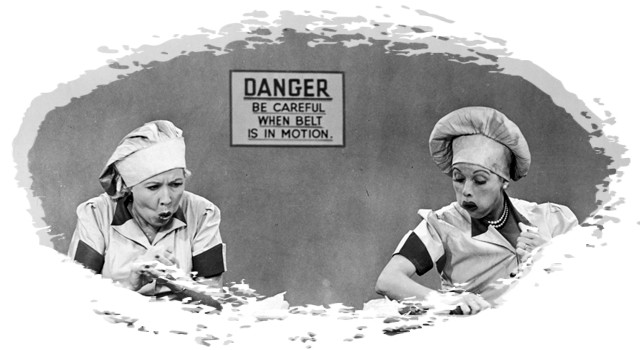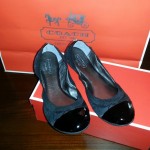
By Jae-Ha Kim
jaehakim.com
July 31, 2014
The summer after my freshman year in college, I couldn’t get a job.
It hadn’t occurred to me that I should be looking for a job while I was still in school. By the time I started summer break, every job I applied for had already been filled by students whose schools had gotten out earlier.
There was one job, though. It was working on the assembly line at a factory not far from home. The only reason they had a vacancy was because my friend, who went to a different college, had worked there for a few weeks. She hated it and quit, but gave me the heads up.
I was pretty sure my parents wouldn’t want me working in a factory. After all, they had emigrated from Korea to the United States to give us a better life. Surely, a factory wasn’t what they had in mind for their youngest child.
I was taken aback when my parents said I should jump at the opportunity.
Realizing that they wanted me to take the job, I pointed out that I might have to work the night shift.
Fine, they said. I could drive myself or my father could drive me.
My job was to assemble and test windshield wipers. On my first day–which was a month after the rest of the college girls had started–our foreman asked one of the full-time employees to show me the ropes. I felt horrible for her that her production was slowed down because she had to show me how to do the job. I wasn’t a fast learner and was amazed at how quickly she could sort, assemble and test the machinery.
Watching me give it a shot, she pointed out that I could earn more money if I got more parts done each day. Honestly? That didn’t make me work any faster, because I was always worried that I’d get my fingers or hand stuck in some of the machines.
The other girls attended local state schools in the area. I attended a private university. We all got along and rolled our eyes at the disgusting men who’d smack their lips, leer at us and say things to us like, “All that meat and no potatoes.”
There was a full-time employee who was in charge of micromanaging our little division. Maria was a pretty Mexican woman, maybe in her mid-20s. I never really noticed it at the time, but she never looked at or talked to me, unless it was to point out that I had made a mistake. That was fine. I was busy doing a mental countdown every day of when I could leave my shift.
As the weeks wore on, I saw her changing her wardrobe slightly to match that of the blonde college girls in her charge. She started wearing madras, Lacoste shirts and deck shoes. She pulled back her hair into high ponytails adorned with scrunchies.
One Thursday, she excitedly invited all the girls over to her house for a sleepover. There’d be pizza and sodas, and she was going to rent some movies for them to watch.
I say them, because I wasn’t invited. I found out about it when one of the other girls asked why I wasn’t going. Maria had told the group that I couldn’t come because I was busy.
On Friday, Maria came up to me and said, “Oh, I know you know about my sleepover. You can come, too. I just didn’t think you’d want to.”
Actually, I didn’t want to. Even then, I liked to separate my private life with work. Plus, a friend and I were going to a concert, where we would end up hanging out with the band backstage. But that’s another story all together. 🙂
Before each of the girls went back to school, they brought in treats to share with the people on our shift. Because my school was on a different schedule, I didn’t quit until a month after they did.
On my last day, the woman who had showed me the ropes on my first day passed out the cupcakes I had baked for everyone. She proudly announced to everyone that “her little Jae” was studying to become a lawyer at the University of Chicago.
Maria’s mouth dropped. She came running over to hug me and said, “Why didn’t you tell me you were a college girl?”
I said, “I didn’t think it was important.”
I don’t know this for a fact. But I’m pretty sure this is true. Maria saw me as a dark-skinned minority, like herself. Aligning herself to me wouldn’t help her step up in social status. To her — and probably to many people — I was just another immigrant working in a factory, because that’s all that I could do.
My mother worked in a factory for most of her life. Had she married later and remained in Korea, she most likely would’ve become a pharmacist. But that’s not what was in the stars for her.
When we came to the U.S., my bright, beautiful mother who spoke English with an accent, worked her fingers to the bone assembling complicated pieces. Because she was smart and learned quickly, the engineers and draftsmen would give her their drawings to decipher and piece together.
She worked full-time and overtime for decades. She was rarely home on Saturdays because she was at work. She didn’t attend my sister’s college graduation, because she had just started a new job that paid a lot more money than she had been receiving and she didn’t want to jeopardize her position by asking for an unpaid day off so soon.
It was primarily my mother’s factory earnings that paid for my fancy, university education. But she was happy to let people think that it was my father’s salary that paid for everything, because he had the respectable office job.
My mother never wanted me to tell people she worked in a factory. It wasn’t a classy job, she said. No matter how many times we told her that her success story is something to be proud of, especially in America, she didn’t want us to make a big fuss about it.
I don’t think that my story is unique. So many immigrant children grow up quickly watching their parents struggle to make decent lives for themselves in this wonderful country that wasn’t paved in gold after all.
I am privileged to have the life that I have now. And I hope that somewhere out there, Maria has made a life for herself with which she is happy, too.
© 2014 JAE-HA KIM | All Rights Reserved






Your mother raised you well. I’m glad that you are recognizing all of her amazing achievements.
I’ve worked with women like Maria. One of them made my life hell. I don’t think it’s a coincidence that she was black and I was the only Asian working there. she was as nice as could be to all the white women we worked with. At one point I even brought a gift for her and she told me she didn’t like it and to get her something else. It makes me ashamed to think that I tried to make this woman like me. I ended up having to quit because she made my life hell.
This brought tears to my eyes. My parents struggled for us too. I sometimes wonder what life would’ve been like if we had not immigrated. Although my life is wonderful here, I do believe that my parents would’ve been happier back home.
Another beautiful and powerful piece, Jae. Thanks for sharing.
“…Plus, a friend and I were going to a concert, where we would end up hanging out with the band backstage…”
No teasers, please fess up!
😛 If I reveal the band, then everyone will know that I’ve been lying when I say I’m 29. 😉
Your mother is amazing.. And so are you.
OK, – I think I’m a know-it-all, but I have no idea what this means: “All that meat and no potatoes.” PM me if necessary!
I don’t know what it means either!
listen up u 2 http://www.urbandictionary.com/define.php?term=all%20meat%20and%20no%20potatoes
Mike Ruffone has it right:
“Comes from the 1940’s song by Fats Waller, “All That Meat and No Potatoes.” The phrase refers to a physically attractive woman with an otherwise nice figure ‘all that meat,’ but who is proportionally small breasted, ‘and no potatoes.'”
A very tacky thing for middle-aged men to say to 18 and 19 year olds.
I thought you all would get it. I’ll give Jack Brickhouse – Chicago sportscaster a pass, though, what with him being deceased and all but … 😉
Great post
Hi, Jae! I hope you remember me. I’m Julie… your long-lost friend from high school 🙂 How are you doing? I just wanted to say hi. Is that you next to Katie Couric? Wow.
It’s fascinating that we have the same interests (I love gossip, celebs, and yeah, Friends (have the box set!)) and I ended up as a reporter. Only everything I do is on a much smaller scale, LOL. I’m not paid to read about celebs or to watch Friends, and my reporter job is for two local community newspapers, le Bulletin d’Aylmer. and the West Quebec Post. 🙂 But I’m happy contributing to the community. I hear you’re a mom–please, tell me all the details!
And I’m sorry I’ve been a terrible friend, not keeping in touch. I got very sad after moving here. It was probably a terrible decision. But that’s for another post; I just wanted to say hi and this is probably the worst place to do so. Guess all the world can see! 🙂
btw… yes, assembly lines are the WORST. If you want to see people hustle out the door, blow the whistle at a factory at 4:30. I bet some have matched some Olympic records getting to the cars in the parking lot. LOL.
love J.
My parents both worked in factories and I am humbled by all they did for us. Thank you for sharing your family’s experience.